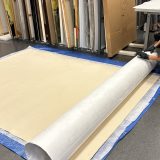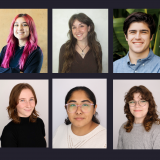So you’re in an MFA program–now what? A guest post by MFA Candidate Candice Yacono
March 26, 2019
From Mid-Career to MFA (Part 2)
By Candice Yacono
As I wrote in the first installment of my “From Mid-Career to MFA” mini-series blog, I’ve returned to school in the middle of my career to pursue the dual degree MA in English and MFA in Creative Writing at Chapman University. Older students can bring a sense of maturity, motivation, and work ethic to an MFA program, as well as a wealth of experience to their own writing.
Chapman University’s Professor James P. Blaylock said he has observed this firsthand in his students. “Their work is sometimes richer in life experience, obviously, and so their characters tend to be rounder, more interesting, perhaps,” he said. “They get details right when they write stories about things that happened more than ten years ago. Their vocabulary and often their line-by-line writing skills are often superior to those of younger students. Their work almost always tends to be less derivative. I don’t want to overstate any of that: there are unique, mature, authentic stories being written by younger students.”
I was happy to hear that it might be an advantage that I didn’t pursue a graduate degree until now. That said, I do give thought to how I am received by others. My advice is to save personal experiences and career successes for when they are most appropriate to share, or when directly asked about them. Nobody appreciates a know-it-all or boaster. Some younger students may not have as much life experience as I do, but I find that I have just as much to learn from them as they do from me.
“The older we get, the more of a mindset we develop (or at least that’s true of me) and so an older student might have pre-conceived ideas about the world and about people and also fairly worked out literary sensibilities,” Blaylock said. “That, arguably, could make them less amenable to taking chances and almost certainly has doused some of the more creative fires of youth.” In other words, older students may be set in their ways and preferences, but the MFA demands being open to new ideas.
“That’s something I figured out a decade ago: I’m not capable of writing the stories and novels I wrote in my thirties and forties, because I’ve lost some of the shoot-from-the hip eccentricity that I had working for me then. On the other hand, I’m certainly a better, more careful craftsman now,” Blaylock said. As we mature, then, we change, and there are losses as well as gains.
Particularly for the older student, it’s important not to go into workshop with the sole expectation that you will be told how talented you are, even though you may want to assume that your maturity or experience gives you the edge. Peer and instructor critiques are an opportunity to learn and improve. Sometimes, I think of workshop as a Las Vegas buffet where you take what interests you and leave behind what doesn’t. Even if you disagree with what is said, avoid responding defensively—just leave it on the table.
I find that the older students in our program offer feedback that varies from the feedback given by younger students. Those of us who have a background in the industry—who perhaps have already worked with editors or collaborators—may offer a more professionally minded or practical critique, and that can be valuable for the discussion.
Of course, our age doesn’t give us a carte blanche to give feedback that can be construed as personal, hostile, or condescending. The goal of critique is not to stomp on the writer’s dreams, even if some editors have done that to us along the way. Rather, having forged a path ourselves, we try to help others forge their own paths to success in the most effective way.

